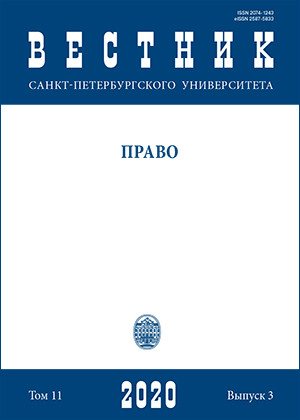Особенности правового статуса председателя суда в России и зарубежных странах: сравнительно-правовой анализ
DOI:
https://doi.org/10.21638/spbu14.2020.314Аннотация
В статье проводится сравнительный анализ правового статуса председателей судов в России и зарубежных странах. Показано, что правовой статус председателя суда является производным от содержания и форм реализации принципа независимости суда и судей. Раскрываются такие базовые составляющие правового статуса председателя суда, как порядок назначения на должность, срок полномочий, предельный возраст пребывания в должности, а также особые полномочия, связанные с выполнением руководящей функции в суде. Рассмотрен вопрос о том, что глобализация правовых процессов с необходимостью влечет унификацию требований к процедурам приобретения и прекращения правового статуса не только судей, но и председателей судов. Раскрывается общее и особенное в подходах в законодательстве различных стран к таким требованиям, предъявляемым к кандидатам на должность председателя суда, как знание делопроизводства, организаторские способности, требовательность к себе и работникам суда, способность к оперативному и качественному внедрению новых технологий в работу суда, поддержание высокого уровня квалификации. Раскрываются возможности выработки единого научно обоснованного подхода к установлению производности правового статуса последнего во избежание произвольности установления законодательных положений в различных странах. Сделан вывод о том, что реально обеспеченная независимость председателя в конкретном суде значительно повысит уровень доверия населения не только к суду, но и к государству в целом, однако для этого данная тема должна стать объектом фундаментальных научных исследований.
Ключевые слова:
правовой статус, судебная система, суд, независимость суда, председатель суда, органы судейского сообщества, судейская этика
Скачивания
Библиографические ссылки
Загрузки
Опубликован
Как цитировать
Выпуск
Раздел
Лицензия
Статьи журнала «Вестник Санкт-Петербургского университета. Право» находятся в открытом доступе и распространяются в соответствии с условиями Лицензионного Договора с Санкт-Петербургским государственным университетом, который бесплатно предоставляет авторам неограниченное распространение и самостоятельное архивирование.






